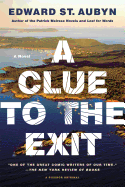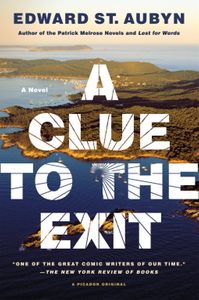
 Edward St. Aubyn (Mother's Milk) calls A Clue to the Exit his favorite of his own novels. Originally published in 2000, it's now being reissued by Picador.
Edward St. Aubyn (Mother's Milk) calls A Clue to the Exit his favorite of his own novels. Originally published in 2000, it's now being reissued by Picador.
Charlie is a hack screenwriter who's just been told he has six months to live. (He takes issue with the idea that his doctor has "given" him six months, as if it were a gift he should be grateful for.) He starts driving more carefully, even as he considers suicide, experimenting with the proper response to this news. He contacts his ex-wife about seeing his daughter; he sells his house and takes half his riches to Monte Carlo to lose it as quickly as possible. And, suddenly inspired, he sets out to write a serious novel--much to his agent's exasperation.
In Monte Carlo, he meets a beautiful stranger, who he imagines might help him with his burden of mortality. Angelique is a gambling addict, and in her company Charlie feels an equal craving for his own writing. They have a deal: she gambles away his fortune, and he writes in the casino as he watches her. His novel, On the Train, tackles the big question of consciousness, or nothing less than the meaning of life, and Charlie's autobiographical protagonist is none other than Patrick Melrose, St. Aubyn's most famous character, who is joined by others that St. Aubyn's fans will recognize from previous work. The characters of the novel within the novel argue philosophy on a train stuck in Didcot, as Charlie finds himself stuck as well between games of chance and the need to map his own final months.
St. Aubyn's craft is on full display with this inward-looking work of simultaneous parody and earnestness. Nearly every line is quotable, a small but shining victory of prose. On the Train visits with Proust and Buddha, while "a clue to the exit" references Henry James on "the human maze," but alongside serious, even wearying considerations, Charlie's story is often very funny and self-referential. A third-person narrative "is so much more personal than a first-person narrative, which reveals too flagrantly the imposture of the personality it depends on," writes St. Aubyn in Charlie's voice: A Clue to the Exit is told in first-person, while On the Train is in the third. This feedback loop is a central device. "Feeling too upset to write, I made the brave decision to write about feeling too upset." A parade of absurd characters and dinner parties accompanies Charlie's, and his character Patrick's, contemplations of death. As Charlie's six months run out, St. Aubyn continues to surprise his reader in the final pages.
A refined and stylish novel of cynicism and the question of death, A Clue to the Exit is a perfect sample of St. Aubyn's craft. --Julia Jenkins, librarian and blogger at pagesofjulia
Shelf Talker: Edward St. Aubyn's favorite of his own novels surveys characters from his other work, in a clever, sophisticated consideration of death and consciousness.

